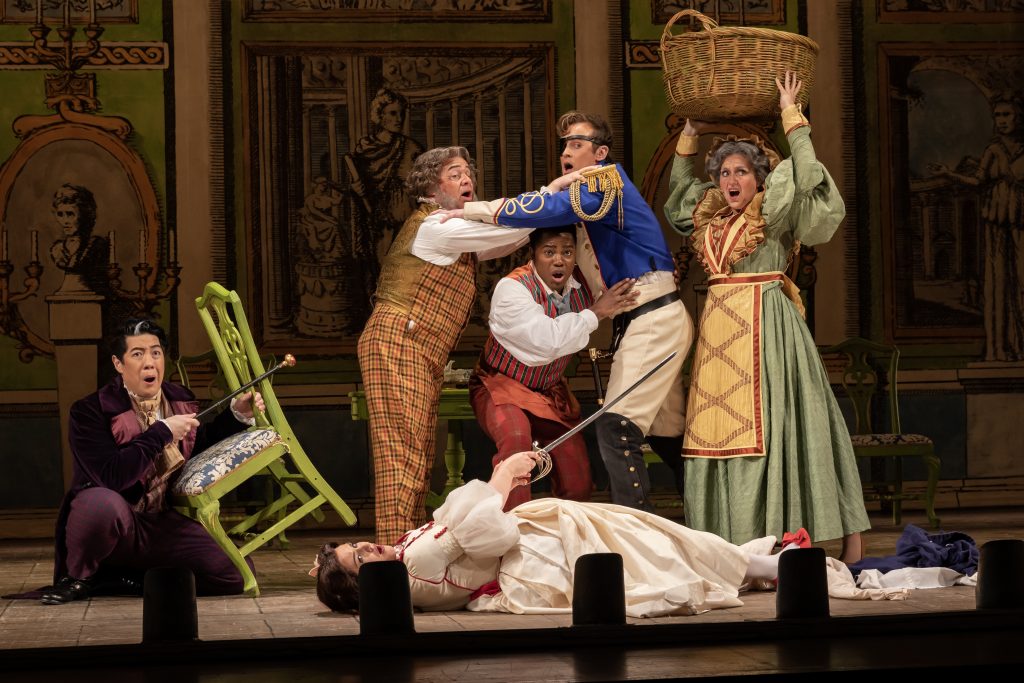Florentine’s ‘Barber’ Oh-So Familiar
Final show of season offers not-so-fresh take on Rossini's famed comic opera.
A century before Bugs Bunny and Looney Tunes, the “Figaro Figaro Figaro” refrain from the The Barber of Seville (more accurately “Il Barbiere Di Siviglia”) was already a comic touchstone, some would say tombstone.
It is so famous that creator Gioachino Rossini is both the large inviting face on the lavish backdrop saluted by the cast in the Florentine Opera Company’s final production of the season and the standard portrait illustration for encyclopedia explanations of 19th century “bel canto.”
This is both the most well known and most parodied comic opera of all time – all the traditions of Italian singing and repetitive flow, all the famous aria patterns, all the notes held pianissimo and then fortissimo — all embodied in this barber, one of 39 operas Rossini wrote.
Its choice to close the season with this one brings simultaneous exclamations of “what a masterpiece” to “that old thing,” which may explain why the 2,100 seat Uihlein Hall of the Marcus Performing Arts Center was less than half full Friday night, only one of two performances the Florentine did on the weekend.
In its fresh casting the Florentine sought a bit of surprise for patrons accustomed to imported operatic names. It still turned to the shared regional opera expense of a traditional model — an elaborate commedia set, Technicolor costumes and the Rossini-saluting staging by Christopher Mattaliano, a theatrical vision originated in Minnesota but known from D.C. to Omaha.
And that’s fine if you are mainly going to emulate what audiences envision and the operatic mime history of the commedia dell’arte stock characters (sung in Italian with English supertitles repeating the constant duplications). Here you do have a skilled Metropolitan Opera veteran, baritone bass Patrick Carfizzi, to boom low notes villainously and caper in falsetto voice as Dr. Bartolo, who wants to marry his own ward, Rosina. Carfizzi was there almost as an example reminding the rest of the Florentine cast what flourishing gestures, comic postures and exaggerated note emphasis were being sought by director Mattaliano.
The staging often echoed what the music and libretto seemed to demand — metronomic exactitude, making every musical flourish echo each other, making everyone shake their heads, wiggle their feet and wave their handkerchiefs in comic unison.
I’m not so sure. While they were obedient to the outline, the presence of newcomers in many of the lead roles was suggesting other possibilities. There were actually more newcomers than the Florentine planned, since illness forced understudy Patrick Bessenbacher to adroitly step in to play the lead tenor role of Count Almaviva. Also relatively new to their major outings was the soothing, quietly enveloping mezzo of Katherine Beck as Rosina, a first-time full performance in this role, as well as the engaging Leroy Davis who brought a warm lively baritone and boastful manner to Figaro.
Now these men did not always have the pop and guttural punch called for within the music despite the care of the Milwaukee Symphony Orchestra under conductor Francesco Milioto to pull back as needed and step out very carefully with a Rossini playbook they probably learned in high school.
Bessenbacher’s high lyric tenor was attractive, and he seemed to like the humor when his lover turned nasal or angry. But his early entry was weakened by useless mime staging that seemed to think that gesticulations to the portrait of Rossini would make the crowd sympathetic. And when it comes to variety of tone, he still has to grow.
Davis was warm particularly when he loosened into the mischief of the role, but both men were being too dutifully obedient to the staging playbook set for them.
Beck’s Rosina also had a warmth in her interplay that the staging patterns seemed to interfere with.
Carfizzi’s buffoonery in the traditional school of commedia opera mime demonstrated that there is amusing finesse in the method. And there was some good mechanics and amusement, if too much mugging from bass Adam Lau as a slime-selling Don Basilio. Hidden too long under comic simpering and doddering movement was a good soprano, Laura McCauley. But much of the production would have clearly benefited from less Keystone Kops and more remembrance that Rossini didn’t intend to be set in dull stone for the ages.
Dominique Paul Noth served for decades as film and drama critic, later senior editor for features at the Milwaukee Journal. You’ll find his blogs here and here.
Review
-
Eating Burmese in Bay View
 Dec 13th, 2025 by Cari Taylor-Carlson
Dec 13th, 2025 by Cari Taylor-Carlson
-
Casablanca Is a Milwaukee Success
 Nov 30th, 2025 by Cari Taylor-Carlson
Nov 30th, 2025 by Cari Taylor-Carlson
-
Oh, Those Witty 18th Century Brits
 Nov 24th, 2025 by Dominique Paul Noth
Nov 24th, 2025 by Dominique Paul Noth





















